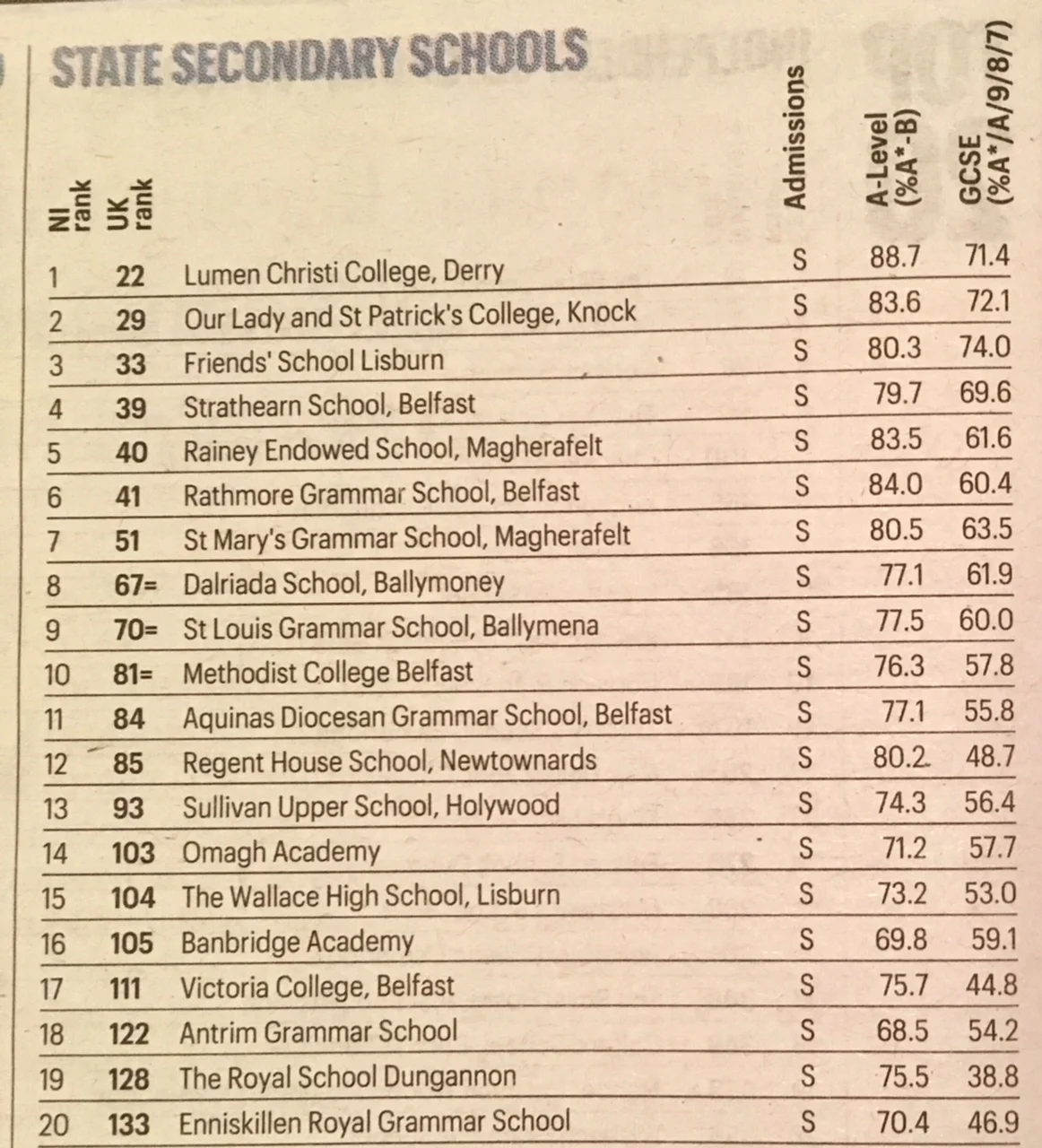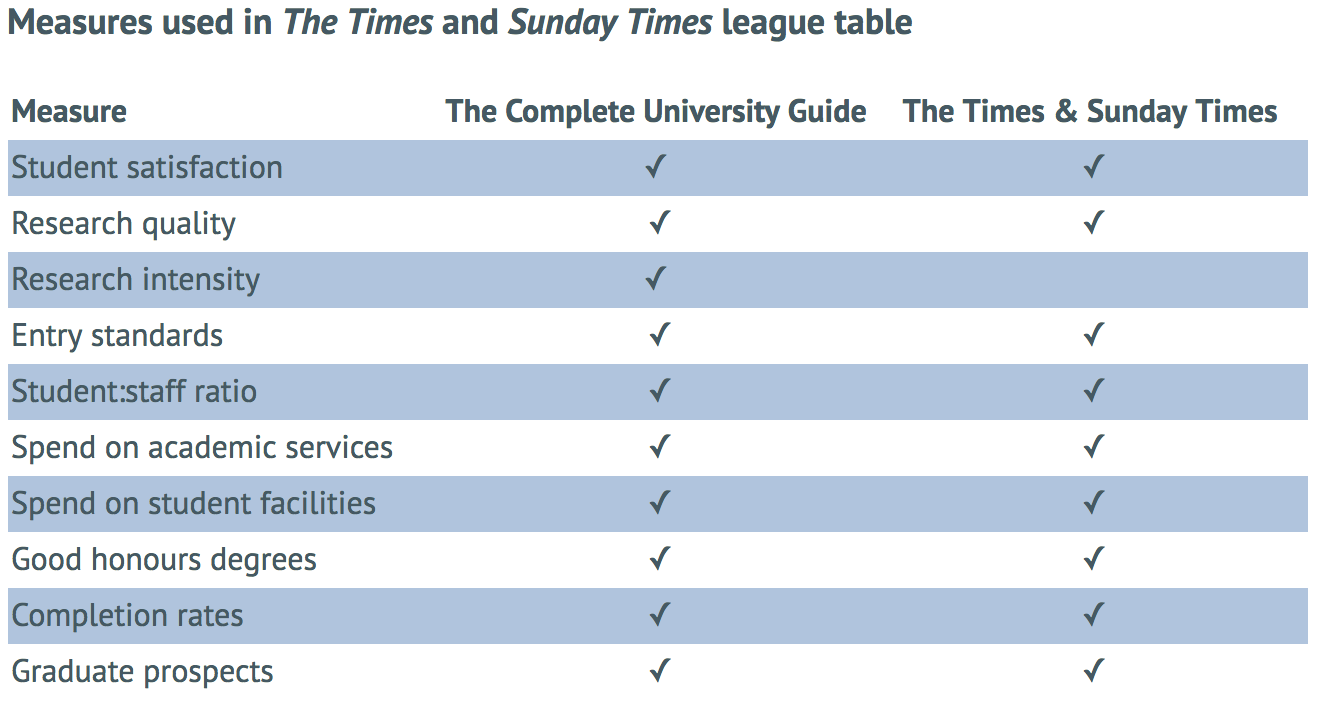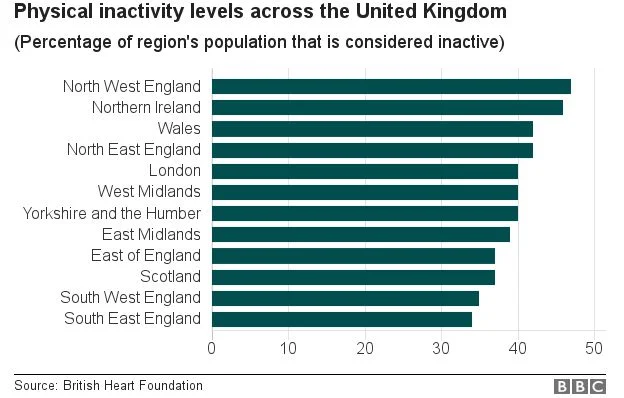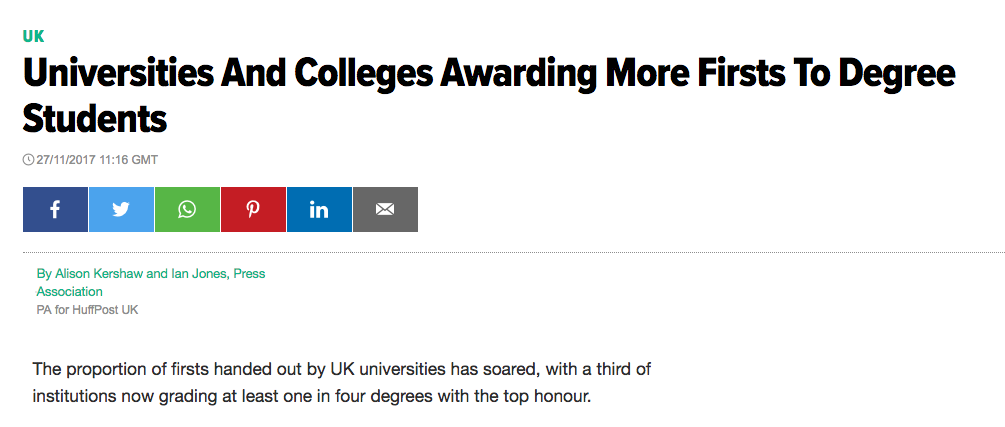NI Schools top League Tables, but is it the Pupils who Lose out?
ARE SCHOOL LEAGUE TABLES GOOD FOR PUPILS TOO?
The latest Sunday Times figures are out (below) and NI schools do exceeding well, the Mr Kiplings of the educational world. League tables, based purely on exam results. How many As did the school obtain in GCSEs and A-Level. Is this the right way to measure success? And with thousands of primary school age boys and girls across NI being subject to up to four selection exams, is there a better way?
School league tables are taken extremely seriously by top schools in NI. At school open days, many schools flaunt their exam pass-rates as a key, if not, the key reason for going to that school. We will get your child to University.
Schools v Universities League Tables
When the Sunday Times reviews Universities they use a completely different set of criteria to schools. Not all are applicable to schools but many are and could be relatively easily obtained for schools. Why is there such a variation in assessment and ranking?
Why aren't schools measured on more than exam percentages? Shouldn’t school league tables also mention student satisfaction? Graduate prospects? What happens those who don’t get good exams? Completion rates – how many children don’t do exams?
Problem with Percentages
League tables based purely on percentages create three issues for schools.
(1) Start with the best pupils. Aim to get the best of the primary 7 (Year 7) crop. That is why boys and girls across NI have had to sit up to four selection exams back to back each November. Then the schools seek out those parents by showing off the school, often highlighting their league table results most. This helps create a vicious circle and reinforces the selection based system.
(2) Only choose those pupils who will get the best results. If a pupil is not going to achieve good results then they can be guided elsewhere. Rather than have 100 people sit exams, pick the best 30 and focus on them. In percentage terms, there is no difference between 3, 30 and 100, so your student pool becomes smaller. Why risk bringing in pupils that may lower your average? In England, newspapers reported a school that allegedly prevented pupils starting Year 14 (Upper Sixth) because they didn't secure at least 3 B grades. It is probable that some form of similar filtering system is already working in some NI schools.
(3) Choose exams that will generate the best results. Not all subjects are the same and not all exam bodies are equal. When points mean prizes, there is an incentive to choose the combination of subjects and exam bodies that will provide the highest grades. With coding so important to high value highly needed NI jobs, why are there only a handful of schools in NI offering computer studies? There can be a lack of thresholds and teacher skills in some areas, but what is the incentive to address it?
Why Focus on Exams?
For many grammar schools the focus is heavily orientated towards getting people towards University. Why is this? I was one of the last generations to have free education, yet most of the people I know have now settled into careers that are not directly related to their degree and/or could have been achieved without going to University.
Many of the top banks, consulting and accountancy firms are now offer apprenticeships for school leavers that will provide them with immediate experience, pay and clear progression route. University would not necessarily offer them a faster track. Whilst these firms will continue to take on large numbers of graduates, there are increasingly other routes and opportunities to join them.
In Germany, teenagers are offered a variety of choices, apprenticeships, work experiences, further education and universities. Germans are on average up to 50% more productive than NI workers* - they can do a lot more in a lot less time. Should we not be exploring this model more? (NB Germany is 37% more productive than the UK - and the UK is 15.9% below the G7 average - whilst NI is 19% less productive than the UK average)
Apprenticeships are highly undervalued and underappreciated by many grammar schools. Have you tried to get a good plumber, electrician or good tradesperson. Not only are these skills highly valuable but they are high in demand across the world. Ask any person who has went to Australia, USA or elsewhere would they have preferred a trade.
Even for those who pass through University, how many jobs are there out there. Much of the recent job growth in Belfast has been in hotels, services and computer related jobs. Is coding taught enough? Are people pointed towards hotels, leisure and catering? They may be dismissed by principals but they often have clear training and career paths and again are transferrable across the world.
Many of these career paths are open to people without exams, and those whose skillset can’t shine through exams. I was part of a pilot career day one time in NI, and two of my co-presenters had left school at 16. They’d been ignored by teachers. They told their stories of bullying and neglect in school, trying this and that outside of school, failures and success before gradually learning. Both were still under 21 at the time but one was already working for a US magazine and the other was doing graphic design and web work for Ferrari. They were, and still are inspiring people and in 20 years listening to hundreds of presentations – they’re both in my top 5 most memorable and most moving.
They’ve went on to Ted Talks, and be Top 30 under 30 etc since. One analysed University and some top professions: lawyers, teachers and accountants. They showed graphically how much it would cost to do the course, average debts afterwards, number of available jobs (per graduates) and average pay. This was compared to the learning to code route, which led to more available and higher paying jobs at much less cost. We were loathed and never invited back. We hadn’t told them all to go to University.
University is as much about social and personal development as it is academic, and should not be discounted. It just needs put in perspective, and placed among a number of life progression paths.
What are we Neglecting?
NI’s Department for Education recommends each pupil aged 12-16 receives 2hrs of physical education each week. Yet in 2016, a NI Assembly research report states that 63% of girls do school sport for an hour or less each week. There is a significant drop off in female sports during teenage years, how is this being tackled in schools?
Physical activity, lack of sedentariness, targeting obesity – all things that can provide a significant improvement in a person’s long-term physical health, are not being met. Are sport and physical activity being given the same prominence as exams? What life lessons are pupils learning from this?
What about Mental Health?
Exams make pupils feel anxious, imagine having the pressure of an exam at age 11 that may heavily shape your future. Determine if you can go to the same school as your friends. 1 in 3 parents said that testing was making their primary school age children anxious, and that’s not counting parents themselves. Childline also report rising levels of anxiety among teenage children directly related to exams. We can’t eliminate all stress on school age children but we should be able to place exams in a better perspective for them.
What isn’t mentioned in exam results?
Exam results are a defined end result. They don’t necessarily show the individuals progress made, i.e. where they started from to where they finished. On a general level some statistics show percentage of pupils on Free School Meals. This is a generalised socio-economic classification, but what about educational classification. There has been a significant rise in the number of pupils defined as having special educational needs (SEN). On average 1 in 4 pupils in NI are now classified as having SEN with approximately 1 in 4 of them (~1 in 20 overall) having a statement of SEN, indicating they need significant additional support. There has also been a significant rise in autism, with between 1 in 30 and 1 in 40 pupils at school age thought to have autism. How do league tables account for that? What incentive is there for schools to take on pupils with SEN and support them through exams, exams that are recorded in league tables?
What role have Schools in Exam results?
If schools are to be judged purely on exam results, it is important to know exactly what role they have had in those exam results. Crudely, was it the solely the school that achieved them? This is where tutors come in. There are over 72 private tutors or tutor firms in NI listed on yell.co.uk (the online version of the yellow pages). Gumtree, Google and online forums can provide many more. There are stories of one teacher taking a class during school hours and most of the pupils then going to another tutor after hours. Tutoring is available for every level, from selection exams to GCSEs, A-Levels and all in between. This excludes course-work risks, dangers of essay writing websites and teachers providing tutoring to their own pupils outside school hours.
The level of tutoring in NI is a dirty secret, everyone knows but doesn’t want to let on. Why should a school look into tutoring that is helping students get better grades? Grades the school gets ranked on. Tutoring is an industry in NI. How is that fair on those children who don’t get tutored or can’t afford to get tutored? What impact does this have on children’s anxiety levels? What impact does it have on teachers who may be failing their students but whose performance is inflated by the role of external tutors?
And when they get to University?
Many universities across the UK are going through grade inflation. Provide more bang for your buck, better chance of a higher grade here. Incentives are everywhere.
Conclusion
It is often said that the education system is the best, and worst thing, in NI. We should be proud of it, but we should also make it equal for all and not two sides of the same coin.
Policy, Research & Analysis Unit | McGarry Consulting | mcgarryconsult.com/blog





